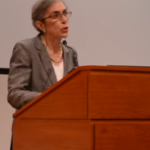The Uses of “Hate”
Supreme Court for striking down the Texas sodomylaw.
Since I hadn’t written about homosexuality as such,
or even about the merits of the Texas law, I wondered how
he got that impression. It’s possible to disapprove of
sodomy *and* the Texas law *and* the Court’s ruling, and
I do. But no matter how clearly you try to write, you
can’t stop people from reading their own notions into
your words.
Needless to say, it’s very common these days to
respond to an argument by addressing not the point the
writer is making, but his supposed feelings about the
subject. Was it always so, or has the world taken a
turn for the worse lately? I can’t say, but few would say
we live in an age distinguished by logical thinking.
If you reject a political claim made in the name of any
category of people, you can expect to be accused of
hating all the people in that category.
This kind of thinking has gotten especially silly in
the area of“gay rights” and “homophobia,” terms too blurry to mean much. It’s not that I want to plead notguilty to the charges; I merely want to point out howunrealistic the charges are on their face.
Lots of people disapprove of sodomy and find it
disgusting. These attitudes are ancient and are implicit
in all our slang and jokes about the subject. But how
many people who hold them really hate homosexuals without
distinction? Very few, really. The ones who do have often
had unpleasant personal experiences that explain their
hostility; yet I have a friend who, though he was
molested as a boy and completely shares my views on the
matter, harbors no special animosity toward homosexuals
in general.
Despite all the rhetoric of bigotry that assails us
these days, it just isn’t that easy to hate
indiscriminately. In fact such hatred seems unnatural —
or, if you prefer, idiosyncratic.
But some people find a strange moral satisfaction in
positing a ubiquitous“hate,” usually against“minorities” of one sort or another. And of course this“hate” requires the state to take various actions toprotect the alleged victims, to make reparations, toreeducate the bigoted public, and finally to “eradicate”the proscribed attitudes. This stipulated “hate” seems tofill a vacuum in the moral universe, much as the rarefiedether was once believed to fill the emptiness of outerspace.
So“hate” endows the state with a vast mandate forcorrection. Citizens must be treated as potential, evenpresumptive, bigots. “Discrimination” must be anticipatedand forbidden. Ambitious laws and programs must be passedand implemented. Old freedoms — of association,property, commercial exchange — become suspect and mustbe abridged.
And the scope of the state must be expanded to
include even the inspection of our motives. It isn’t
enough to ban overt“discrimination,” since we may be“discriminating” furtively; and because we may be lyingabout our real motives, the state must also enforceoutward compliance with “civil rights” laws (byimposing racial quotas and the like). Meanwhile, moreand more things are said to be “discriminatory,”including marriage.
All this must be most encouraging to the sort of
people who think of the state as an instrument for the
complete overhauling of society and human relations. What
better starting point for such a project than a presumption of guilt against — well, everyone?




